FOR THE first time in half a decade, the Ateneo Blue Eagles are once again the kings of the University Athletic Association of the Philippines (UAAP) Men’s Basketball tournament. The dream season sealed the legacy of a new breed of Blue Eagles into the Ateneo lore. Let us take a deep dive into the members of Ateneo’s ninth UAAP Men’s Basketball Championship: The Blue Eagles Band of Brothers.
Tab Baldwin, and the importance of player development
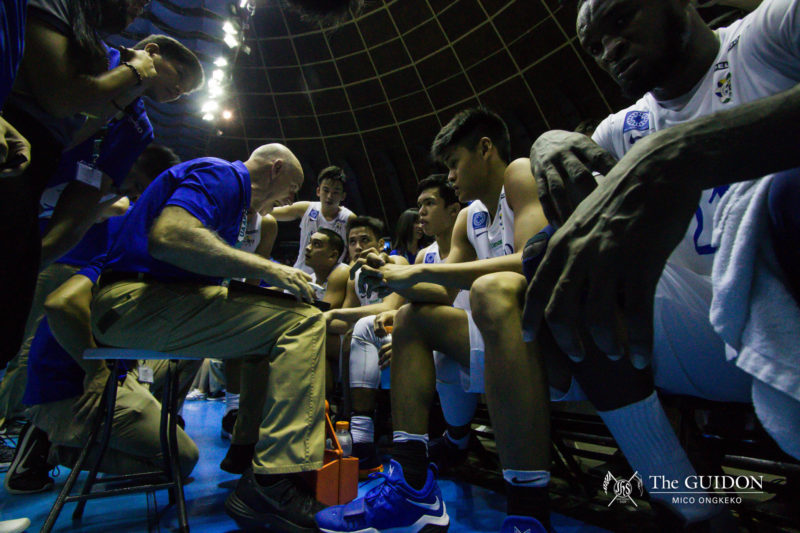
There was a hint of astonishment when Head Coach Tab Baldwin took the reins of the Ateneo basketball program two years ago. Many wondered why such a well-travelled coach, who had stints at the helm of various national team programs and professional squads across the globe, would handle such a raw team with no clear path to success.
Baldwin overhauled the program the moment he set foot at Loyola Heights, coping with the departure of two-time most valuable player (MVP) Kiefer Ravena, Von Pessumal, and a handful of stellar players by instituting a team-centric system. This shift of direction away from the star-dominant basketball seen in years past introduced a more egalitarian offense, making sure that each and every player on the team did their part and understood their roles.
“I don’t really believe in the superstar syndromes and all of that sort of stuff,” Baldwin told The GUIDON before the season began. “My goal and my objective is that our most talented players and our least talented players all understand what they can contribute to our team.”
Much has been said about this team-centric approach, but Baldwin achieved success not by focusing on the system, but by putting player development as the utmost priority. Any system is bound to fail if the players are incapable of performing what it demands, which was why Baldwin believed that having good players trumps any system.
The individual leaps that some players have made in the past two seasons benefited the team immensely and served as little victories for the overall team success: Thirdy Ravena went from amassing a total of 15 points in his rookie season to averaging exactly 15 points per game this season; Matt Nieto went from a subpar marksman to making the most threes in the entire league; and Chibueze Ikeh transformed his game on both ends of the floor in a such a short timeframe.
In just two years, it is clear that many members of the team significantly improved under Baldwin’s tutelage. Team Captain Vince Tolentino said that he learned more about the game of basketball from Baldwin in the last two years than he did in his whole lifetime.
Baldwin knows that college is only a stepping stone for some of these players’ basketball careers. He built the Ateneo basketball program around their potential, helping them develop the necessary tools to succeed and instilling a great amount of confidence in their abilities. Baldwin joined the Blue Eagles not to win titles, but to unlock the potential that these young players possess. The championship was never the end target; it was a simply a byproduct of the process.
“Our goal is not to win championships. Our goal is for these guys to realize their professional dreams,” Baldwin said at an appearance on ANC’s Hardball. “We are trying to build [the program] around their dreams and aspirations. I think we’re at the right path.”
THE STARTERS
Thirdy Ravena
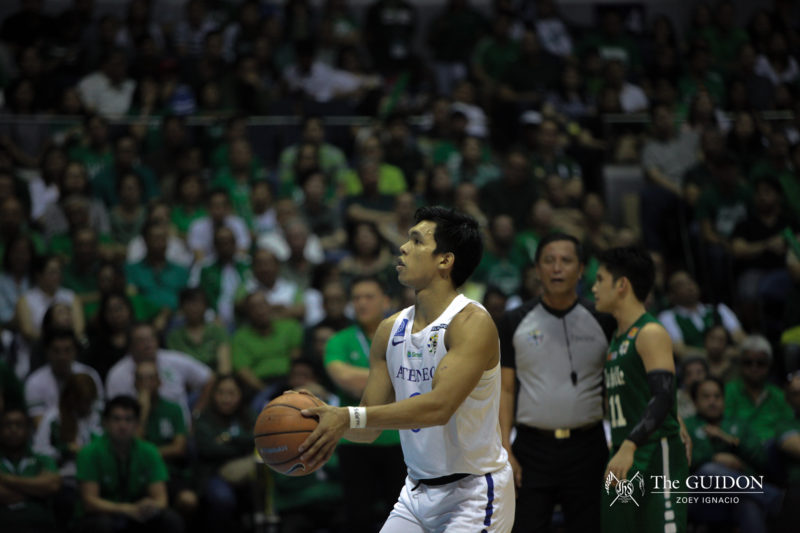
No other Blue Eagle entered the college ranks with as many expectations to meet as Thirdy Ravena.
There was pressure from living up to the legacy of his father, Bong Ravena, a former collegiate star from the University of the East (UE) Red Warriors and a Philippine Basketball Association (PBA) legend. There was also pressure to follow the footsteps of his older brother, Kiefer Ravena, a two-time UAAP champion, two-time MVP, and arguably one of the top five greatest Ateneo basketball players of all time.
Aside from living up to the family name, Ravena also faced the challenge of replicating previous accolades in the Juniors division. In UAAP Season 76, Ravena bagged the MVP award, notching incredible norms of 18.7 points, 11.2 rebounds, and 4.3 assists in his senior year of high school.
But despite the excitement surrounding the debut of the last Ravena on the basketball court, his rookie season was tainted with nerves and disappointment. From the eye test alone, it was clear he was overwhelmed on the court. His stats supported this claim, as he averaged a mere 1.4 points and 1.3 rebounds per game.
The following year was even more difficult for the young forward, as he was forced off the team due to academic difficulties. In an interview with The GUIDON prior to last season, Ravena called that year as “the worst year ever, basketball-wise” for him as he was unable to don the Blue and White, and also could not practice with both the UAAP squad and Team Glory Be.
Two years, two UAAP Seniors Division Mythical Five awards, a Finals MVP, and a UAAP title later, the thoughts of freshman Thirdy Ravena are a distant memory.
“Looking back, the pressure was all coming from myself, me trying to think that I should do what my brother did,” Ravena said on Hardball. “I remember Coach Tab telling me, ‘The only pressure you have to deal with is the pressure you put on yourself to reach your maximum potential.’”
Last season, Thirdy Ravena marked his return to the league with a vengeance, posting numbers of 9.9 points, 6.5 rebounds, and 2.3 assists. He took another gigantic step forward this season when he showed to be more consistent, dominating the UAAP with averages of 14.4 points, 8.4 boards, and 3.3 dimes, all while shooting 45.2% from the floor. The high-energy forward also led Ateneo in scoring in all five playoff games, scoring 16.6 points per game in that stretch.
The most impressive part of Ravena’s rise to superstardom has been his improved poise in clutch situations. His nerves were still slightly evident in the team’s first victory over La Salle, when he tried to take matters into his own hands with Ateneo down by one with under 10 seconds remaining. He would end up turning the ball over, nearly costing Ateneo the game.
Just a month later, Thirdy Ravena would go on to carry Ateneo back from an eight-point fourth quarter deficit in a do-or-die game against Far Eastern University (FEU). In Game One of the Finals, Ravena would find Isaac Go inside for the dagger and-one to seal the game. Similarly, Thirdy overcame a ticking shot clock and a defensive lockdown from Ben Mbala to find Isaac Go for the now-iconic game-sealing triple in the decisive third game of the Finals.
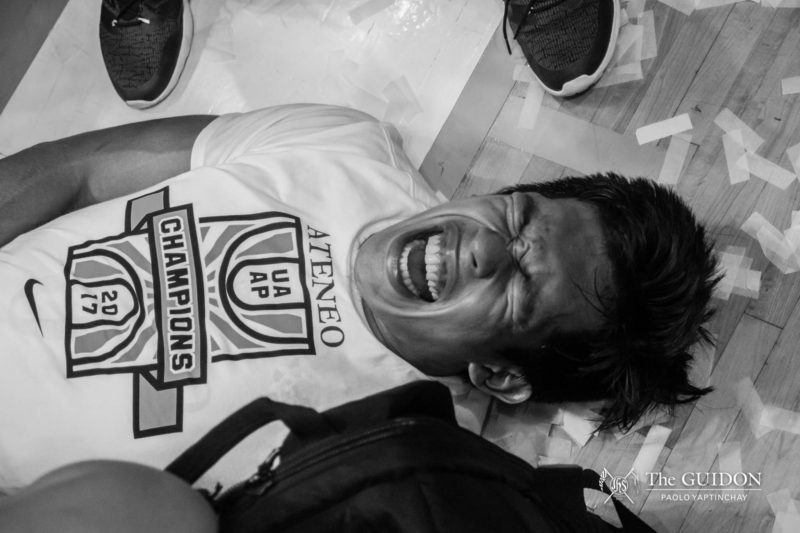
All of Ravena’s triumphs culminated in him receiving an award that neither his father nor brother received in their college days—the UAAP Finals MVP award. Moved to tears after Ateneo had won the title, it was clear that the victory lifted all the weight off the 20-year-old’s broad shoulders, who can now rightfully call himself a champion.
Matt Nieto
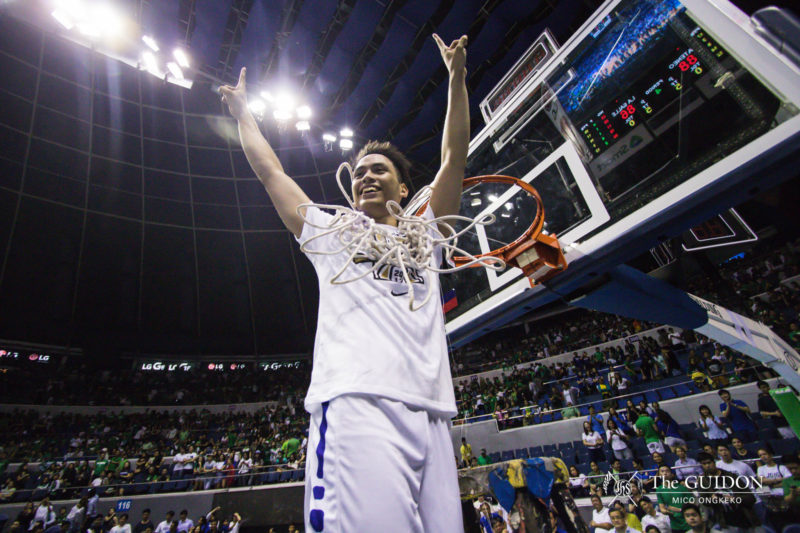
Before the season began, Matt Nieto’s starting point guard spot was far from assured, even after Adrian Wong’s season-ending injury. Jolo Mendoza was a more polished scorer, and Tyler Tio, who hit a game winning bucket over Letran in the preseason, was the dark horse candidate because of his smooth offensive game.
Perimeter shooting had always been the main crux of Matt Nieto’s otherwise well-rounded game, leading many to cast their doubts about his lead role in Baldwin’s offensive system, which relied heavily on the three-point shot. His first two seasons in the seniors division saw him record an abysmal 7/29 from deep, per HumbleBola. If Nieto wanted to become a top-tier guard in the UAAP, he needed to shore up that aspect of his game.
And so he did. Not only did Matt Nieto improve his three-point shot to a respectable rate, he went on to become the best three-point shooter in the entire UAAP this season. His 36 makes from deep tied him with University of the Philippines (UP) guard Paul Desiderio for most threes made at 43.4%, second only to DLSU’s Jollo Go at 43.5%.
The relentless point guard has grown steadily through the years, evolving from his days as a caretaker point guard in his rookie season to a legitimate offensive threat with the quickness and pace to keep up with almost any foe on the court.
Matt said that his dad, former Blue Eagle Jet Nieto, joked that he and his brother Mike’s title paled in comparison to the back-to-back championships that the elder Nieto had won back in the 1980s. But if Matt Nieto continues to take major leaps in every succeeding season, it will not be long until he matches—or even surpasses—his dad’s lofty accomplishments.
Vince Tolentino
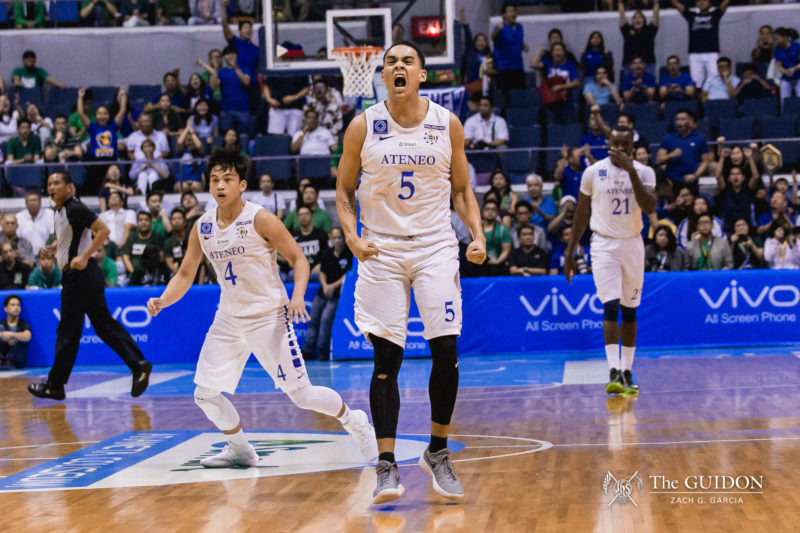
Originally, Vince Tolentino was not even supposed to be a Blue Eagle. Back in 2012, the first team that the Fil-Canadian teenager tried out for was, ironically, the De La Salle University (DLSU) Green Archers. Tolentino only gave Ateneo a try after a suggestion from his dad’s friend. After the first tryout, however, he knew he belonged in Loyola Heights, even without a guaranteed spot in the team.
The forward then went on a grueling climb to reach the summit. He endured a short tenure in Team B while serving residency, and his first stint on the Blue Eagles lineup in 2013 was the first time Ateneo missed out on a Final Four berth since the 1990s. He rode the bench in his first couple of seasons under then-Blue Eagles Coach Bo Perasol, and it was only until the arrival of Baldwin that he became a key cog in the rotation, starting all but a pair of games since 2016, according to HumbleBola.
The forward has since served as the team’s ultimate glue guy, both on and off the court. He rarely led the team in scoring nor enjoyed minutes on the highlight reels, but Tolentino busied himself with the little things and delivered consistently when the team needed him the most. Tolentino was a consistent presence on both ends of the court, with a knack for scoring quick buckets and for pestering the opponent’s most potent scorer when need be. When the team needed a leader, Tolentino was there to answer the call, even if he had his own doubts.
“I wanted a leader, and [Tolentino] said to me, ‘Coach, I’m not sure if I’m the stand-up rah-rah guy, but I’ll do my best to show them where to go,’” Baldwin recounted. “He did a great job.”
Five years after that fateful tryout at the Moro Lorenzo Sports Complex, Tolentino earned himself title only few can be called: The Team Captain of a championship-winning squad.
Chibueze Ikeh
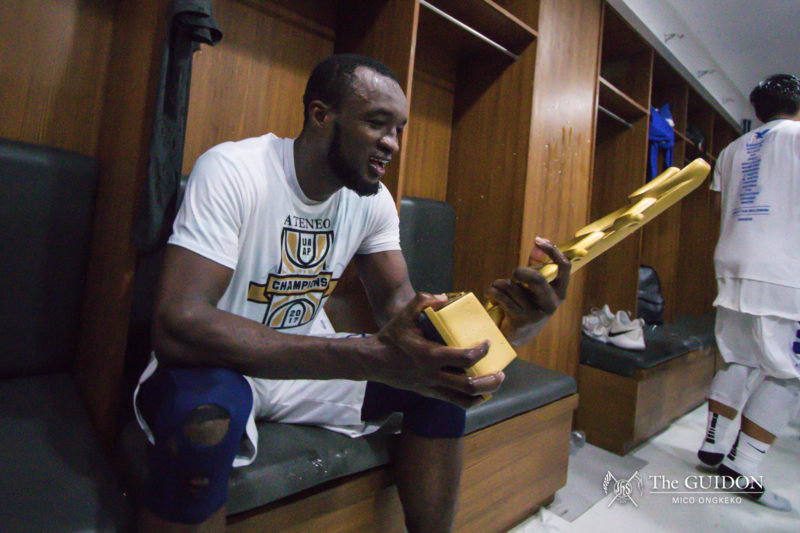
A few minutes after the final buzzer in the title-clinching match, a sea of blue at the Araneta Coliseum showered cheers to the player who came up big in the most pivotal game of the season. Ikeh’s name was echoing around the legendary stadium.
It was a storybook ending for Chibueze Ikeh. His 12-point, 13-rebound double-double in the title-winning match seemingly vindicated Ikeh from all the criticism he had encountered throughout the entirety of his UAAP career.
In his first two seasons in the UAAP, it was obvious that he had the physical tools to be an impact player, but there were holes in his game that hindered him from reaching his full potential. Untimely fumbles and botched defensive rotations were common occurrences, while foul trouble also proved to be an issue for the big man from Nigeria. Ikeh reached rock-bottom towards the end of last season, when numerous listless performances bumped him off the rotation in place of Isaac Go.
A lack of confidence on himself played a major role in this slump, which led to a subsequent loss of confidence between Ikeh and both his teammates and his coach. Because of this, Baldwin started to have conversations with Ikeh, sympathizing with his struggle to fit in here in the Philippines. Slowly but surely, his trust began to rebuild itself, which helped him focus on improving his game.
“This is a young man who left his continent, friends, family,” Baldwin said. “He had to fit in without asking anybody to fit in with him.”
Ikeh made significant strides in the offseason between Season 79 and 80, culminating in a statement opening match against Adamson University (AdU) when he scored a career-high 18 points and grabbed 17 rebounds. Although he did not produce those type of mammoth numbers on a game-to-game basis, his career-high averages in both scoring (7.5 PPG) and rebounding (8.6 RPG) earned him a 10th place finish in the race for the UAAP’s MVP.
The stat that stood out the most, however, was his 5/21 clip from beyond the arc for the season. The percentage (23.8%) itself was below league average, but the fact that Ikeh was even taking threes, considering his zero three-point attempts in his first two seasons, was a sign of renewed confidence. The center even showed some juice off the bounce and finished better through contact, improving both his defensive instincts and court awareness.
In his three years as a Blue Eagle, Ikeh never put up numbers akin to other foreign student-athletes that graced the UAAP, but was a solid, serviceable big man that did the dirty work inside. Ikeh probably won’t be remembered for the numbers he put up, but he will definitely be remembered as something even greater: A champion.
Anton Asistio
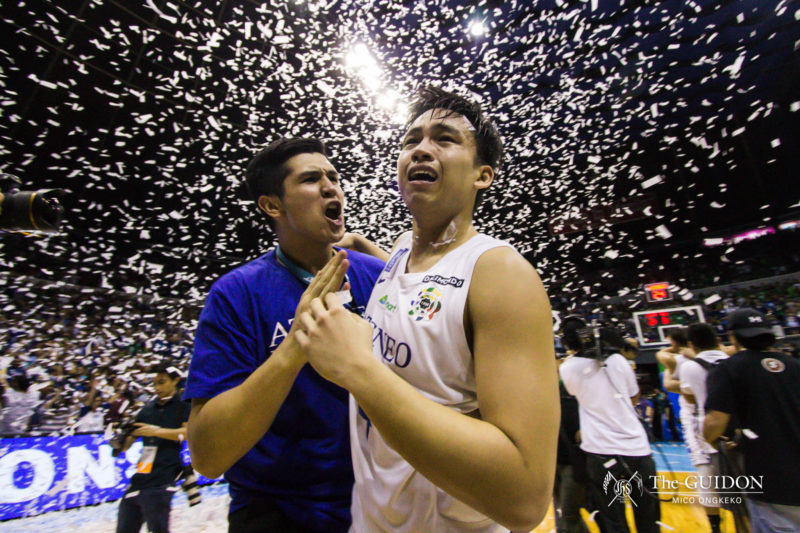
In his first two years in the UAAP, former Blue Eaglet Anton Asistio totaled just six points over seven games, and was often regarded as too small, too weak, and too much of a defensive liability to make a significant impact at the UAAP level.
After failing to latch onto a UAAP roster spot in his junior year back in Season 78, it seemed as though Asistio’s college career story had already been written along the lines of former Ateneo players Fran Asuncion and Carlo Balmaceda. He would likely banner Team Glory Be, and turn into fringe UAAP player from then on.
But Asistio wanted to carve out his own path, eyeing a return to the UAAP as a better all-around player and key contributor. He stayed confident in his abilities and pushed himself to the limit, working on his ball handling, defense, and even tirelessly improving his silky smooth shooting stroke.
After the two-guard led Team Glory Be to a Father Martin Cup championship, he caught a lucky break when the Ateneo Blue Eagles hired Baldwin, who was unfamiliar with all of the team’s potential UAAP players. This gave everyone, including Asistio, a fresh opportunity to prove their worth and earn a spot on the UAAP roster.
With the evident strides Asistio made in his game, he found himself back on Ateneo’s UAAP squad, this time as rotational piece on the team. After Asistio helped lead Ateneo to a runner-up finish in Season 79, he cemented himself as a permanent fixture on the Blue Eagles’ starting five this season.
However, with opposing teams becoming more aware of the 5’10’’ sniper’s strengths, Asistio began to struggle in the second half of this season. In a nine-game stretch from the beginning of the second round to the Final Four, Asistio failed to score in double figures, shooting just 25% from the field in that span. This all culminated in Game Two of the Final Four against the Tamaraws, where Asistio was subbed out two minutes into the first quarter, taking only one field goal attempt in just eight minutes of action.
Once again, hard work and unwavering confidence catapulted the veteran guard out of his struggles at the best possible time. In the UAAP Finals, Asistio scored in double-figures in all three games, drilling 9 of 21 triples. He upped his scoring average from 7.1 points in team’s first 16 games to 11.3 points in the UAAP Finals.
A true X-Factor for Ateneo in the finals, his first senior division championship was made sweeter by his past endeavors.
“I think one thing is that nababa ako sa Team B,” Asistio said about winning the UAAP Season 80 Championship. “It’s so special for me kasi parang nanggaling ako sa baba ta’s na-reach ko ‘yung goal ko.”
(I think one thing is that I was downgraded to Team B. It’s so special for me because it’s as if I came from the bottom and then now I’ve reached my goal.)
Asistio’s recipe of hard work and confidence has brought him to the pinnacle of success at the college level. Silencing the critics who underestimated him for his undersized frame, Asistio can now shine the coveted UAAP medal in the face of doubt and enjoy the long-awaited glory he has undoubtedly earned for himself.
THE BENCH
Depth could have very well been the biggest difference between the Ateneo Blue Eagles and the rest of the league. Their bench was number one in the league in scoring during the Elimination Round, averaging 38.5 points per game. In Ateneo’s gruelling two games against FEU in the Final Four, the bench kept them afloat, outclassing the Tamaraws’ bench during their double-digit loss in Game 1, and outscoring the opposing bench by four points in their four-point victory. In the UAAP Finals, the Ateneo Blue Eagles bench outscored the La Salle bench by 10.7 points per game. Here are the cast of characters that made up the best bench in UAAP Season 80.
Isaac Go
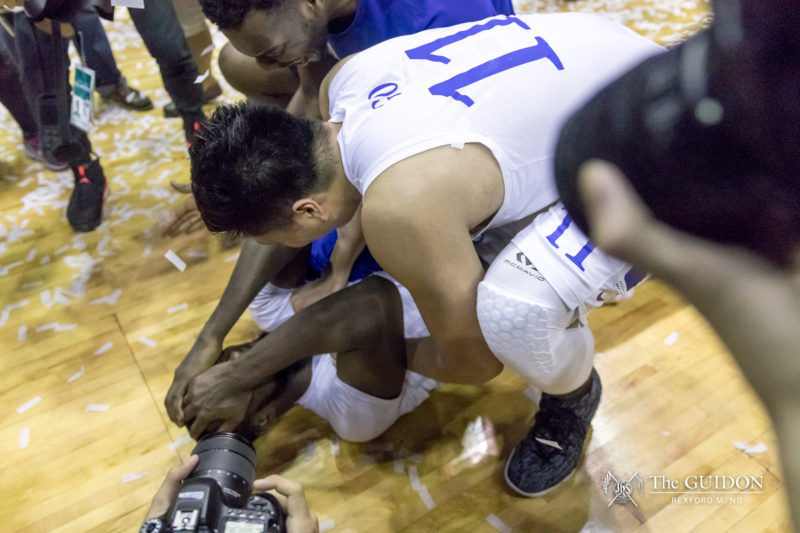
There is nothing that Isaac Go seems to love more than coming up big in late-game situations. Whether it was saving Ateneo with a game-tying three in the Final Four against FEU, or sealing a couple of UAAP Finals games, Go just has a knack for coming through for his team when they need it most. His iconic triple that sealed Ateneo’s championship almost seemed scripted, one that will now be remembered alongside the legendary Finals moments of Larry Fonacier in 2002 or Ryan Buenafe in 2010. The Blue Eagles would not have won, let alone be in the finals, if not for Isaac Go.
It has been quite the journey for the former Xavier center. He missed out playing for the Blue Eagles in his freshman year because of a shoulder injury, and barely registered minutes in his debut UAAP season a year after. When Baldwin took the helm in Go’s second year on the team, he immediately saw the potential that the center possessed, and began putting in the hours it took to achieve the ideal physique to unlock it.
Baldwin envisioned a diet initially, telling the pudgy bigman to stop eating rice. But Go quipped that his mom would get mad at him if he did so. “I am already upset with you for telling me that,” Baldwin said in response.
The coaching staff started to work on his mind and body, and the results have significantly manifested on the court. Go emerged as a force to be reckoned with in the stellar second half of Season 79, and was Ateneo’s top producer off-the-bench this season with averages of 7.4 points and five rebounds.
With Chibueze Ikeh departing, it is likely that Go will play a central role for the team next season. His timely baskets have earned him a lofty place alongside the other big-time Blue Eagles of years past, making it exciting to see what the the soft-spoken center will achieve on the court in his final seasons. However, one thing is for sure: Go will never take any credit for any shot that he makes, no matter how pivotal.
“I’m just lucky to even have an opportunity to play for Ateneo,” said Go when asked about his penchant for hitting clutch baskets. “Just getting an opportunity to play in the finals with these band of brothers is that I have to be thankful for.”
Mike Nieto
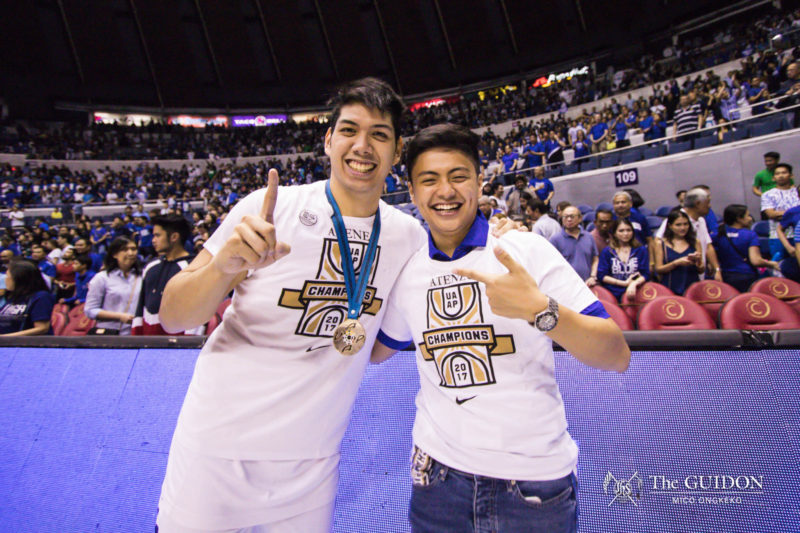
Mike Nieto recorded one of the oddest, yet most incredible statlines one could ever see during the championship-winning game of Ateneo. He had no points, no field goal attempts, two assists, a steal in just six minutes. However, he was a +18, the highest plus/minus rating of anyone in the entire game, in those six minutes.
This line epitomizes the unselfishness of Nieto, one of the leaders of the team who completes all the intangibles unseen in the stat sheet to epitomize the ideal team player. Coming of a breakout Season 79 campaign that saw him start 18 total games for Ateneo, he found himself a member of the bench unit this year, with his minutes dropping from 21 to 14 minutes.
But Nieto found his niche on the bench, coming in as a steadying force capable of stretching the floor from the wing spot, or even matching up with taller bigs like he did against Abu Tratter in the first quarter of Game Three. He occasionally made his presence felt on the offensive end, much like his 11-point performance in Game One, though that was not among his goals as the co-captain of the team.
“Kahit hindi naman ako maka-score, okay lang. Scoring 11 points, it’s not for me individually, it’s for the team. I’ll just do whatever the team needs from me, leading them together with Vince [Tolentino], ‘yun lang naman habol ko eh,” Mike Nieto said after Game One.
(Even if I don’t score, it’s okay. Scoring 11 points, it’s not for me individually, it’s for the team. I’ll just do whatever the team needs from me, leading them together with Vince [Tolentino]. That’s what all I really aim for.)
In the end, it’s all about winning as well for the other half of the dynamic Nieto twins, who will both stick around for another two years to lead the Ateneo Blue Eagles.
Aaron Black
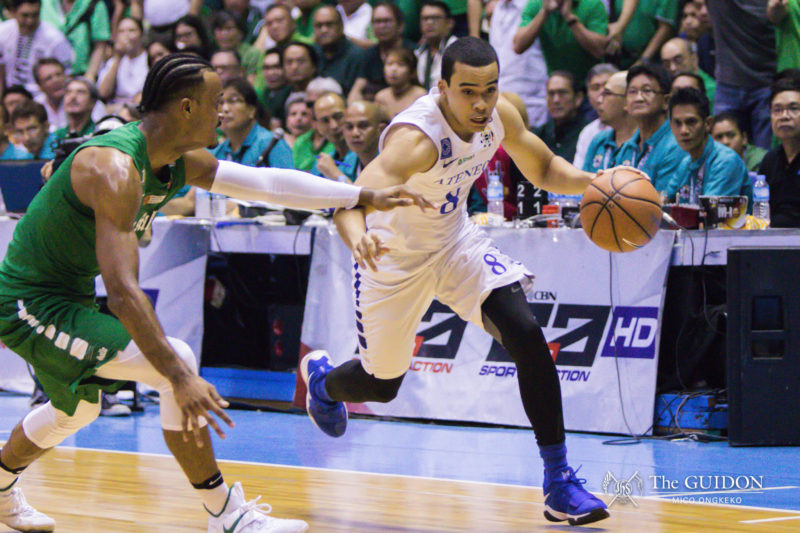
While many of the Blue Eagles stepped up during the UAAP Finals, perhaps none made as big of a leap as Aaron Black. Black doubled his scoring average in the Finals, going from 4.3 points in the Elimination Round to 8.6 points per game in the three-game series.
While it was a roller-coaster season overall for Black, his play in the UAAP Finals was another sign of the next-man-up mentality that the Blue Eagles have practiced all season long. His ability to score, facilitate, and grab rebounds at the two-guard position was a huge asset for Ateneo in their championship run, especially against the athletic line-ups of the Green Archers.
Jolo Mendoza
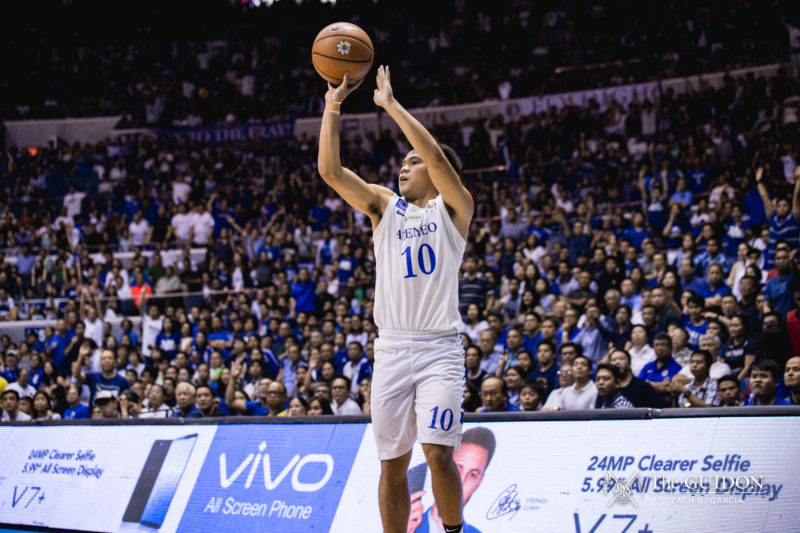
These were the percentages of Jolo Mendoza in all 19 games this season: 51.8% from the field, 54.8% from beyond the arc, and 93.8% from the free throw line. His incredible shooting efficiency was essential for the bench, especially when the team went into shooting lulls. He had a few games this season where he woke up Ateneo’s offense, including a 14-point outburst against AdU in the season opener.
Mendoza still has a lot of room to grow as a ball handler and facilitator. However, he made enough strides as a point guard this year to gain the coaching staff’s trust as the quarterback of the second unit. There’s also still plenty of time for the spitfire guard to develop his all-around game, and it won’t be a surprise to see him gain more responsibility as his collegiate career moves forward.
Gian Mamuyac
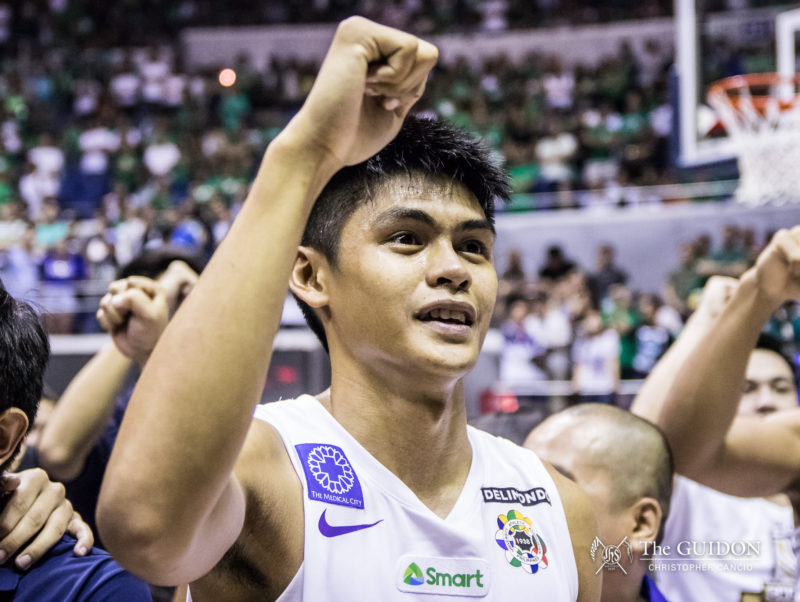
Quietly debuting this season was Gian “Mamu” Mamuyac. While he started out slow, Mamuyac found himself a key member of Baldwin’s defense-first line-ups, specifically in late-game situations. Despite having an unusually thin frame for a basketball player, Mamu’s length and defensive instincts have made him a pest on the defensive end, most notably against Stephen Curry and Ben Mbala.
Like his high school teammate Jolo Mendoza, the 18-year-old Mamuyac also has plenty of room to develop, especially on the offensive side of the floor. His shooting has been suspect all season, having made just 5/23 from downtown this year, but confidence might be the biggest problem of the soft-spoken guard.
“The coaching staff often joke that he has no idea how good he really can be, and even how good he is right now,” Tab Baldwin said in an interview on ABS-CBN Sports and Action’s The Score. “The sky’s the limit for him.”
With a little bit more fine-tuning necessary in the offseason, expect Mamuyac to come back with a more defined role next year. Until then, it’s nice to have seen the versatile wing show flashes of Ateneo’s swiss army knife for the next half decade.
Raffy Verano
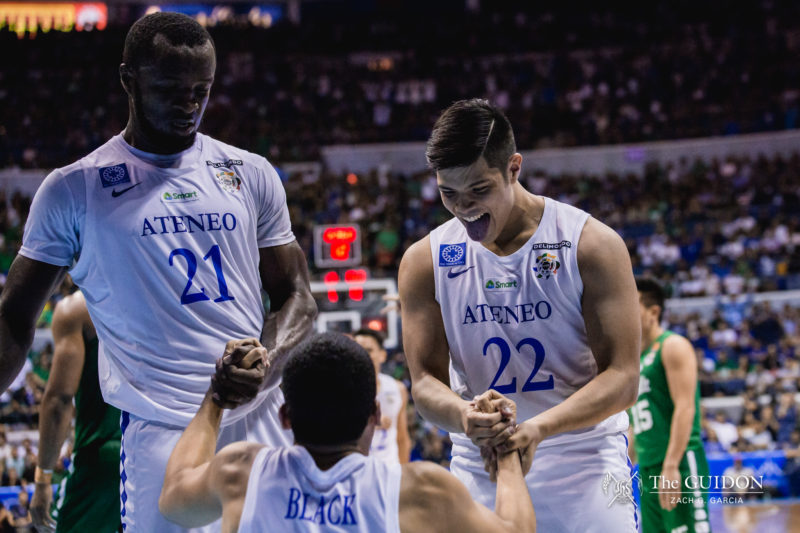
Raffy Verano is another versatile player for Ateneo, but this time for the frontline. His ability to act as both a bruiser in the paint and stretch the floor with his decent outside shot gave Ateneo a unique option on the offensive end. However, what made Verano stand out was his grit. He did not back down from the physicality showcased by the rest of the league, and specifically by La Salle in the UAAP Finals.
“Anything I can do for the team, [I will do,] whether it’d be rebounding or the dirty work,” Verano said in an interview on ANC’s Hardball.
Verano’s play on the court may not be the prettiest, but his blue-collar attitude made him the perfect plug into any line-up for the Blue Eagles in Season 80. With an opening at the starting power forward spot next season, there may be an opportunity for the Filipino-American to be a focal point for Ateneo’s quest for back-to-back titles.
Looking Ahead
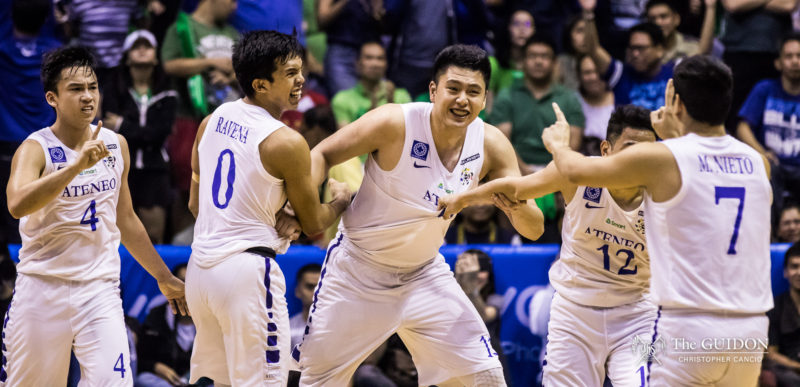
Upon the conclusion of the UAAP Finals, many of La Salle’s players and coaches immediately began speaking of next season, and their quest to reclaim the UAAP crown. The Archers may have very well been an Isaac Go-three away from winning back-to-back titles, and they will still sport a talented roster next year with a proven champion coach in Aldin Ayo. While the status of two-time runaway MVP winner Ben Mbala is still up in the air, internal improvements from a core of Ricci Rivero, Aljun Melecio, Kib Montalbo and Santi Santillan will keep the Green Archers in prime position in the championship hunt.
The rest of the league will be no cakewalk for Ateneo either, with a bevy of contenders looking to take a step forward. Season 80 second runner-up Adamson Soaring Falcons will have their core intact, with Papi Sarr, Jerrick Ahanmisi, and Jerie Pingoy returning to the fold. Meanwhile, the FEU Tamaraws look poised to improve after nearly upsetting Ateneo. Look for FEU to unleash Jasper Parker, who slowly found his groove in his rookie year and ended strong. Both Adamson and FEU could also improve with more familiarity under their respective second year head coaches, Franz Pumaren and Olsen Racela, much like Ateneo did this season under Tab Baldwin.
The UP Fighting Maroons, who fell just short of the Final Four this year, will also be bolstered by Nigerian import and University of Perpetual Help System DALTA Altas transferee Bright Akhuetie. King Maroon Paul Desiderio will also be returning for his final season, alongside Season 80 Rookie of the Year Juan Gomez De Liano.
On the other hand, the Blue Eagles will be losing plenty of depth up front, with Vince Tolentino, Chibueze Ikeh, and Kris Porter all playing out their UAAP careers. Six-foot, 10-inch Angelo Kouame, who has been playing with Ateneo’s Team Glory Be, is set to replace Ikeh as the team’s import for next season, while Fil-New Zealander 6’4” center Patrick Maagdenberg could make an impact as well. Another potential addition to the Ateneo frontline next season is the 6’5” former San Beda College Red Lion William Navarro.
However, much like the rest of the league, Ateneo still brings back a huge chunk of the championship core, particularly from the guard and wing positions. Adrian Wong is also expected to make a return from the ACL injury he suffered a little while after last season. In fact, from the current team, only Anton Asistio will be playing in his final year next season, meaning Ateneo will see a lot of this championship group in the near future.
The road to another gold is surely going to be a daunting task for next season’s Blue Eagles. The pressure of playing as defending champions is one unfamiliar to all of them at this level. However, one thing is for sure: This band of brothers will be ready to fight another battle, together.

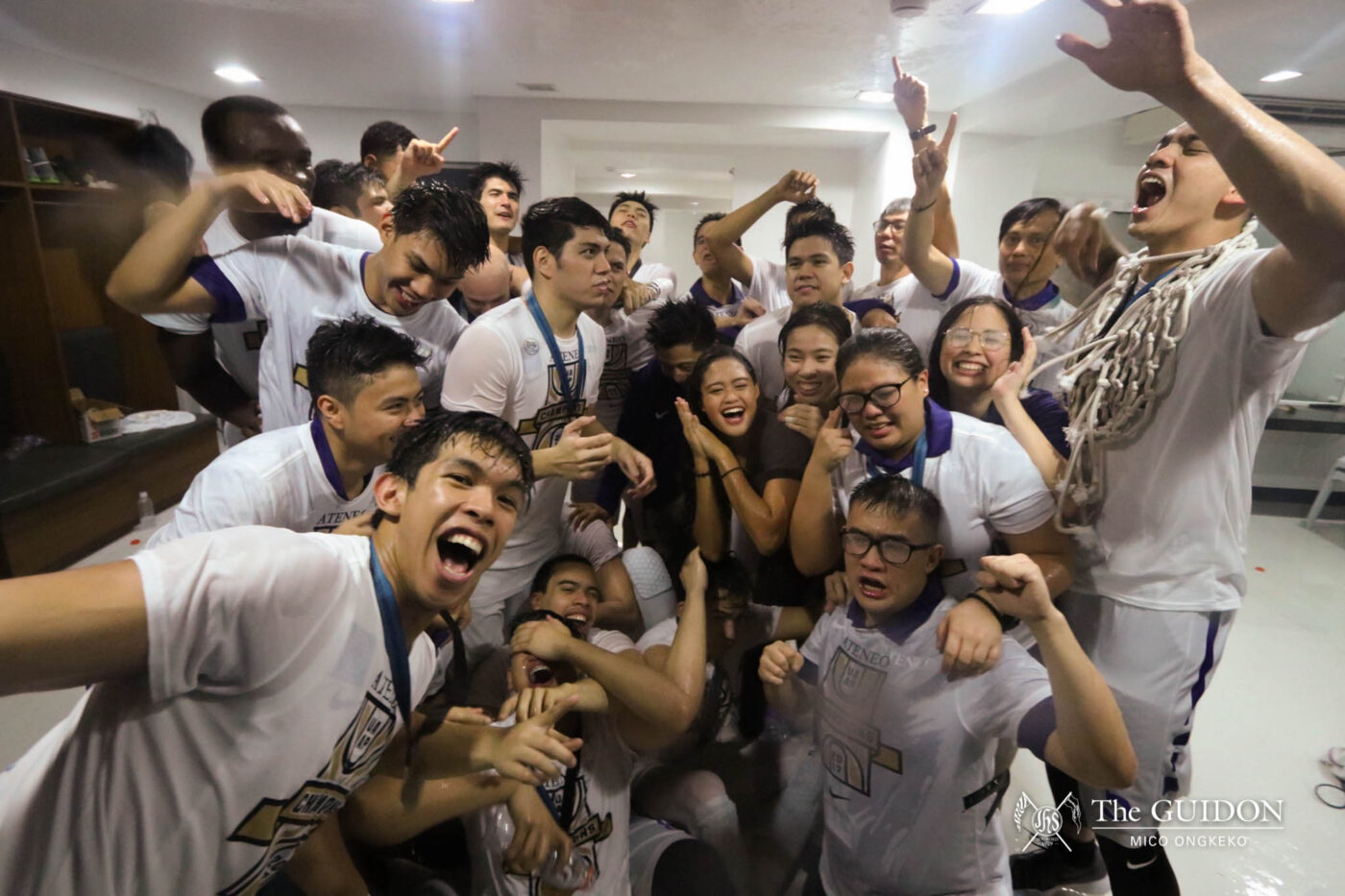



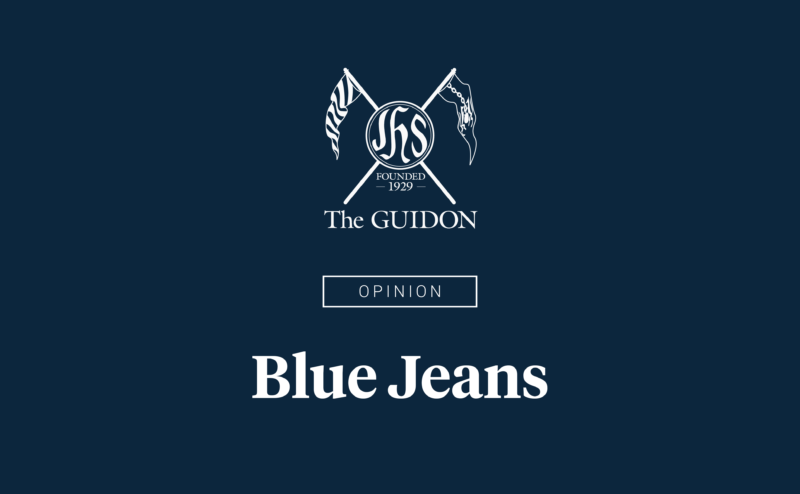


Kudos, Kirby and Colin for a well written article! Keep up the great work.